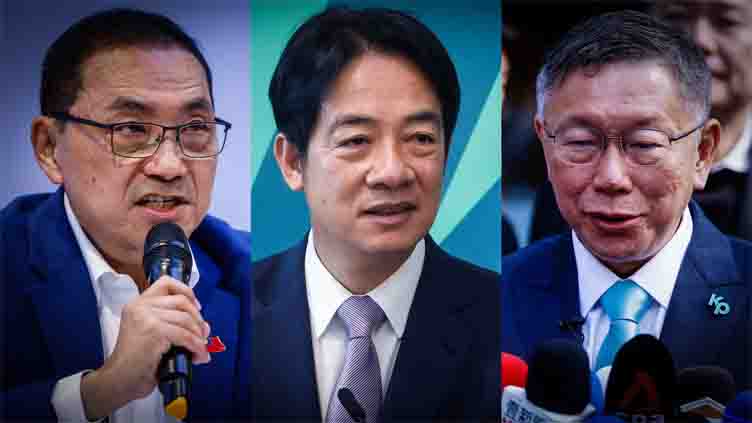Taiwan's election: who are the 3 candidates trying to become president?

World
Taiwan’s election is closely watched internationally due to rising military tensions
TAIPEI, Taiwan (AP) - Taiwan is holding its presidential election on Saturday, a race that China has called a choice between war and peace. China considers the self-ruled island about 160 kilometers (100 miles) off its east coast a breakaway province and has threatened to take control over it, by force if necessary.
Taiwan’s election is closely watched internationally due to the potential for rising military tensions across the Taiwan Strait. At home, voters are concerned with more practical issues such as the sluggish economy and expensive housing in addition to Beijing’s threat.
Here are the three candidates:
LAI CHING-TE
Lai Ching-te, who also goes by William, is currently Taiwan’s vice president from the Democratic Progressive Party, which rejects China’s sovereignty claims over the island. Years ago, the 64-year-old described himself as a “pragmatic worker for Taiwan independence,” drawing criticism from Beijing.
China bristles at any claims of independence by Taiwanese politicians and opposes Taipei having formal ties with other countries. Beijing has repeatedly rejected offers to hold talks with Lai and Taiwanese President Tsai Ing-wen. Lai says he remains open to speaking with China without conceding Taiwan’s right to rule itself.
“As long as there is equality and dignity on both sides of the Taiwan Strait, Taiwan’s door will always be open,” he said in December.
A physician who studied public health at Harvard University, Lai has held public office for the past 25 years, including as a legislator and mayor of the southern city of Tainan.
During his and Tsai’s tenure, Taiwan increased arms acquisitions from the United States, which is bound by its law to provide the island with weapons needed to protect itself. If elected president, Lai has pledged to strengthen national defense and the economy and to continue in the policy direction set by Tsai. His running mate is former U.S. envoy Bi-khim Hsiao.
HOU YU-IH
Hou Yu-ih is the candidate from Taiwan’s main opposition party Kuomintang, or KMT, whose government retreated to the island in 1949 after losing a civil war against the Chinese Communist Party.
The KMT is generally friendlier to China than the DPP, though it strongly denies being pro-Beijing. Traditionally, the party has favored unification with China, though it has shifted its stance in recent years to reflect the vast majority of the population’s preference for maintaining the status quo.
Hou served as the head of the island’s police force before transitioning to politics in 2010. The 66-year-old is currently the mayor of New Taipei, a position from which he took leave to run for president.
Hou has described himself as an atypical KMT member and said he would not pursue unification with China if elected. He has said that Taiwan’s future needs to be decided by its people.
Hou has pledged to strengthen national defense and restart dialogue with Beijing — through cultural and civil society exchanges at first — as part of his “3D strategy,” which stands for deterrence, dialogue and de-escalation.
He describes himself as more likely to convince China to hold talks than Lai, whom he accuses of pushing Taiwan to war. Hou’s running mate is former legislator and TV commentator Jaw Shau-kong.
KO WEN-JE
The third presidential candidate, Ko Wen-je, represents the smaller Taiwan People’s Party, which he founded in 2019.
An outspoken surgeon-turned-politician, Ko advocates for a middle road in relations with Beijing. He has said he would be open to holding talks with China, but his bottom line would be that Taiwan must be able to preserve its democracy and civil freedoms.
He describes himself as the only candidate who would be acceptable to both the U.S. and China.
The 64-year-old was mayor of Taipei between 2014 and 2022 and has cooperated in the past with both the DPP and KMT. An initiative to run on the same ticket as Hou in Saturday’s election failed after the two couldn’t agree on who should be the presidential candidate.
Ko is the most popular candidate among younger voters, who praise his straightforward approach and focus on practical issues such as housing and education. His running mate is Cynthia Wu, a business executive who hails from one of Taiwan’s wealthiest families.


